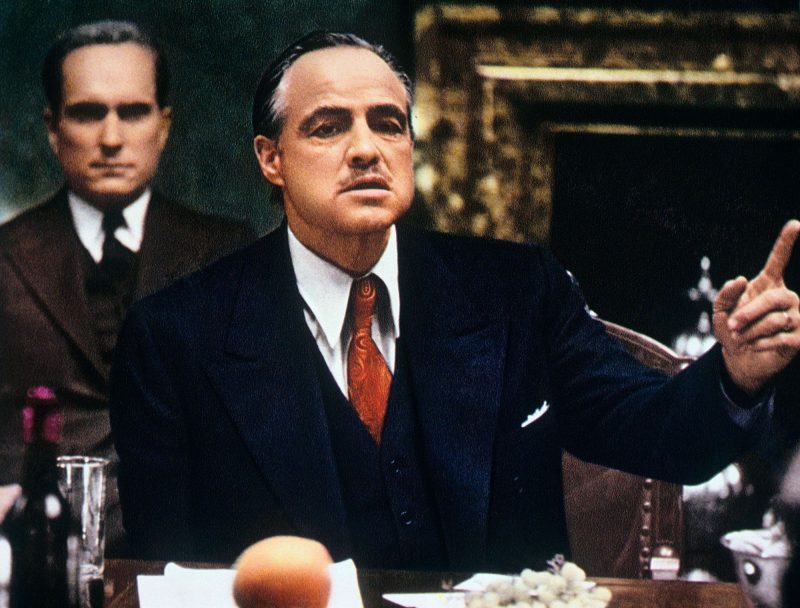
Thursday
Trump Republicans are making much over Democrats’ use of “quid pro quo,” “bribe,” and “extortion.” Their supposed indecision exposes their impeachment as unserious.
Haven’t they heard of synonyms, one is tempted to ask. After all, offering someone “something for something”—to translate the Latin—is the very definition of a bribe. Lawyers, reflecting the Latin roots of their profession, like to use “quid pro quo,” but bribery makes more sense in this instance since it is one of the infractions listed in the Constitution as impeachable. My only quibble is that extortion is probably a more accurate description of what we’ve been witnessing.
To illustrate the distinction, I turn to Mario Puzo’s Godfather. In the novel’s most famous line, Don Corleone speaks of making an offer that can’t be refused. Such an offer is a bribe only if the other party can in fact refuse it. If he or she can’t, it’s extortion.
The line appears only once in the novel, when the godfather promises the Frank Sinatra figure to get him the movie role he covets:
Johnny Fontane could not altogether believe that the Don had such power. But his Godfather had never said such and such a thing could be done without having it done. “This guy is a personal friend of J. Edgar Hoover,” Johnny said. “You can’t even raise your voice to him.”
“He’s a businessman,” the Don said blandly. “I’ll make him an offer he can’t refuse.”
Initially, the Godfather’s Consiglieri (Tom Hegen) offers an end to the studio’s problems with a labor union and with a coke-addicted actor. These are bribes. When the bribe is refused, the producer then receives the bloody head of his prize stallion—which is to say, a threat of violence that knows no bounds. This is extortion.
When you hold up critical military funds in exchange for the investigation of a political rival, you’ve moved from bribery to extortion, although the Democrats are still opting for the “b” word. In his testimony yesterday, EU Ambassador and hotelier Gordon Sondland explained how Trump made his will known:
The ambassador testified that the “three amigos” — he, Energy Secretary Rick Perry and former special envoy to Ukraine Kurt Volker — worked with Giuliani on Ukraine matters “at the express direction of the president of the United States.”
Trump would often tell the trio on Ukraine issues: “Talk with Rudy.”
The Godfather doesn’t even need to say, “Talk to Tom Hagen.” People know that his Consiglieri speaks for him. As Sondland made clear, everyone got the message: Vice-President Pence, Secretary of State Pompeo, Chief of Staff Mulvaney, NSC head John Bolton, and various officials. All were “in the loop.”
Chair of the House Intelligence Committee Adam Schiff neatly summed up the most recent Republican talking point at the end of the Sondland hearing: “My colleagues seem to be under the impression that unless the president spoke the words, ‘Ambassador Sondland I am bribing the Ukrainian president,’ that there is no evidence of bribery.” That’s not how evidence works, nor is it how either Don Corleone or Trump operate. They have other ways of getting their point across.
I’ve already written once how Tom Hagen retains plausible deniability while “negotiating” with the film producer, at one point observing, “I’m a lawyer. Would I stick my neck out? Have I uttered one threatening word?” Yet threatening things nevertheless happen: the producer awakes to a bloody nightmare, a coveted White House meeting never takes place, Ukrainian aid is withheld (until the whistleblower report emerges).
Another instance of Hagen at work gives us further insight into the Trump-Giuliani operation. An undertaker, granted a favor on the wedding day of Don Corleone’s daughter, is later expected to tend to the body of Sonny Corleone. Although initially reluctant to become further immersed in the crime family, he is quickly brought around. Not once is an explicit threat used:
He was surprised at the coldness in Hagen’s voice. The Consiglieri had always been a courteous man, though not Italian, but now he was being rudely brusque. “You owe the Don a service,” Hagen said. “He has no doubt, that you will repay him. That you will be happy to have this opportunity. In one hour, not before, perhaps later, he will be at your funeral parlor to ask for your help. Be there to greet him. Don’t have any people who work for you there. Send them home. If you have any objections to this, speak now and I’ll inform Don Corleone. He has other friends who can do him this service.”
Amerigo Bonasera almost cried out in his fright, “How can you think I would refuse the Godfather? Of course I’ll do anything he wishes. I haven’t forgotten my debt. I’ll go to my business immediately, at once.”
Or as Sondland testified,
We did not want to work with Mr. Giuliani. Simply put, we played the hand we were dealt. We all understood that if we refused to work with Mr. Giuliani, we would lose an important opportunity to cement relations between the United States and Ukraine. So we followed the president’s orders.
A major goal was (as Deputy Assistant Secretary George Kent reported) to have “President Zelensky to go to a microphone and say investigations, Biden and Clinton.” Worried about Joe Biden in the upcoming election, Trump monitored the situation closely, talking regularly to Sondland. Had it not been for the whistleblower, it might have worked: it appears that the Ukrainian president, frightened for his country if not for himself, was prepared to go along.
Had Trump pulled off his scheme and if Biden were his opponent, the president would have hammered the word “corruption” the way he hammered “e-mails” against Hillary Clinton. Every rally would have the crowd chanting, “Lock him up.” The payoff could have been immense.
And he didn’t have to get his hands dirty or use the word “bribery.” That was Rudy’s job.

